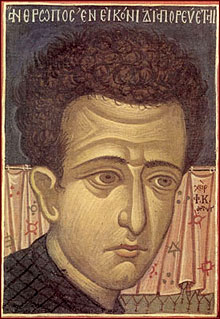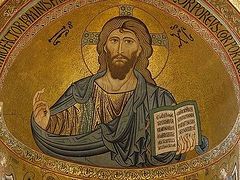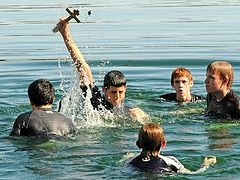 Photis Kontoglou Photis Kontoglou |
| Photis Kontoglou |
At my next noteworthy meeting with Kontoglou, which took place at his home in the evening of Sunday, April 20, 1958, our conversation was chiefly on contemporary Greek theologians and on Byzantine art in the West.
Kontoglou spoke of certain ‘scientific” (epistemones) theologians, men who had studied theology in Europe and brought to the Greek universities a rather cerebral and so- called “liberal” mode of theologizing. Theocletos Pharmakidis (1784-1862), he noted, was the first Greek theologian of this type. Of recent ones, he cited Demetrios Balanos.
Such theologians, he said, regard traditional Orthodox theology, which comes from the roots of Christianity and from the Greek Fathers, as “ossified,” and they come as “renewers” of it. Actually, they lack real faith, lack interior, spiritual life. They view theology as a science, comparable to chemistry and physics, which employ discursive reason as their instrument and give rationalistic explanations.
In criticizing theologians of this type, he quoted a statement of St. Dionysios the Areopagite, that one cannot gain possession of the truths of Christianity in a purely intellectualistic manner, that these have to be experienced, lived. He also read the following passage from St. Symeon the New Theologian (11th century), the greatest of the mystics of Byzantium:
He who thinks that because he has been disciplined in secular wisdom he knows everything will never succeed in beholding the mysteries of God, until he first wills to humble himself and become a “fool,” divesting himself both of his pride and of the knowledge which he has acquired. For he who does this, and follows with unhesitating faith those who are wise in things divine, and is guided by them, comes together with them to the city of the living God. And led and illumined by the Holy Spirit he sees and is taught those things which no other man can behold and learn. And then he becomes one taught by God (Kontoglou, Pege Zoes, “Fount of Life,” 1951, p. 82).
In a book which was published four years after our meeting, he wrote about such theologians:
Today’s theologians have become scientists, like the doctors, chemists and engineers, because by presenting themselves as such they will be honored by the world. And they go to Europe, the place of spiritual darkness, to receive a degree. They stuff their heads with a multitude of ungrounded and vain philosophies, and come to our land to transmit their unbelief instead of the Faith.... They do not enter into the Heavenly Kingdom, and hinder others from entering, as our Lord has said. Their punishment is that they do not see any of the wondrous things that are seen by believers, and hence they lack contrition and are cold. They are separated from God and His Kingdom, because they love the glory of men, instead of the glory of God (Semeion Mega, “A Great Sign,” 1962, pp. 16-17).
In another book, Papa-Nicholas Planas, which was published three years later, again emphasizing the importance of faith and piety, he says:
They endeavor today, with the plight of the Church, to find its causes, and hold that the answer is to be found in “scientific” theological education. But the evil is to be remedied only by education in piety (eusebeia).... What will it benefit the Church if students go to (say) Geneva? They will return with Protestant principles. We are told by these same persons that our Church has remained behind a whole century. How good it would have been if the members of the Church today had the piety of those who lived a century ago! External [secular], scientific education is fine when it is joined to piety (Athens, 1965, p. 46).



